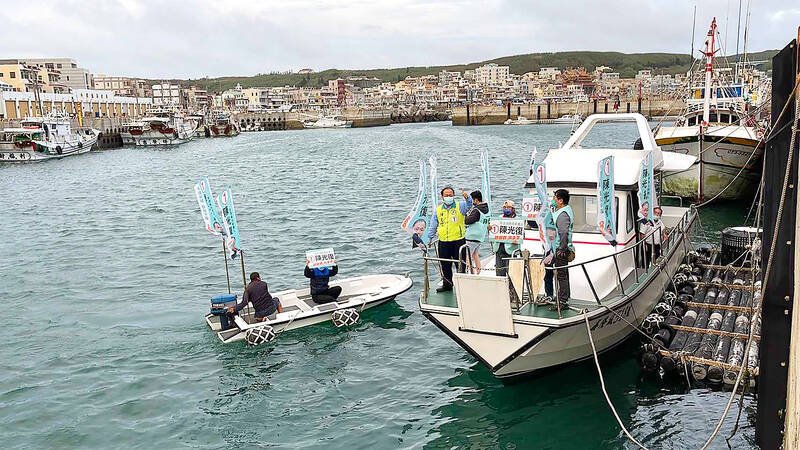Taiwan often finds itself in the international media spotlight during flare-ups in tensions with China, but as the local elections approach, foreign media are looking at how the vote would affect Taipei-Beijing ties and the 2024 presidential election, and women’s participation in politics.
On Saturday, voters are to elect 11,023 public officials, including mayors, county commissioners and councilors, and decide on a referendum to amend the Constitution to lower the voting age and minimum age of candidacy to 18.
Deutsche Welle Taipei bureau chief Tsou Tzung-han (鄒宗翰) said Germans wanted to know whether President Tsai Ing-wen (蔡英文) of the Democratic Progressive Party (DPP) has aligned voters with her policies toward China.

Photo: CNA
That interest has grown since German Chancellor Olaf Scholz met with Chinese President Xi Jinping (習近平) earlier this month in Beijing, which was generally perceived as negative and has brought “cross-Taiwan Strait tensions” to the attention of Germans, Tsou said.
Kyodo News Taipei bureau chief Matsuoka Makoto said that Japanese were concerned about Taiwan’s security, particularly after Xi’s statement last month that China would not rule out the use of force to annex Taiwan.
He also said they were interested in Tsai’s campaign strategy to frame the elections as a battle to “resist China, protect Taiwan.”

Photo: CNA
Marie Yang, correspondent for The Filipino Channel, said she was interested in how the conflict between China and Taiwan would affect the elections and whether voters favored the Chinese Nationalist Party’s (KMT) approach to China or that of the DPP.
Some reporters were focused on how the elections could shape the playing field going into the 2024 presidential and legislative elections, and whether it could serve as a launching pad for outgoing Taipei Mayor Ko Wen-je (柯文哲) of the Taiwan People’s Party (TPP) to run for president.
The popularity of TPP-backed candidates in the nine-in-one elections would be a major benchmark and could open the way for a political shift in Taiwan, said Tomasz Sniedziewski, a freelance correspondent from Poland who has lived in Taiwan since 2011.
Thompson Chau, who relocated from Yangon, Myanmar, less than a year ago and covers news for a Japanese news outlet, said he was looking at the elections through a different lens.
Local issues and the individual candidates are far bigger factors at play than relations with China or the next presidential election, he said.
Plagiarism accusations against candidates have featured much more prominently in local news than China relations or attempted murder or corruption charges against individual candidates, he said.
“It could be puzzling for outside observers,” Chau said. “This speaks volumes about how different Taiwan’s local elections are compared to national-level elections.”
The dominance of stories about academic plagiarism scandals in the campaign showed that “trustworthiness” is a primary issue of concern for voters, said Mira Luxita Sari, editor-in-chief of news site Indosuara Indonesia.
Among the 19,825 registered candidates in this year’s elections, 95 are vying to head 22 cities and counties, and 24 of them are women, the most in the past 30 years, Central Election Commission data showed.
In addition, a record 32 percent of the candidates running for city or county councilor are women, it said.
Tsou said the high percentage of female candidates running for office has been an interesting angle for foreign media, especially as it starkly contrasts with the all-male Central Politburo of the Chinese Communist Party.
One aspect of the elections that has caught some reporters’ eyes is the lack of an absentee voting system in Taiwan, which means voters must cast their ballots in person at designated polling stations where their households are registered.
For example, a student whose household is registered in Kaohsiung but is attending university in Taipei or a businessperson who works overseas must travel home to vote.
European Pressphoto Agency photojournalist Ritchie Tongo said the elections are generally “peaceful” compared with the Philippines, his home country, and some Southeast Asian countries that experience killings and shootings in what are called “bloody elections.”
As a journalist who left Myanmar less than a year ago, Chau said that “it is exhilarating to witness democracy in action across Taiwan,” where people are probably used to the rallies, loudspeakers, campaign souvenirs and speeches.
“It bears noting that many people in the region are still fighting very hard, or even losing their own lives, to oppose authoritarian rule in this day and age,” Chau added.

Chinese Nationalist Party (KMT) Chairman Eric Chu (朱立倫), spokeswoman Yang Chih-yu (楊智伃) and Legislator Hsieh Lung-chieh (謝龍介) would be summoned by police for questioning for leading an illegal assembly on Thursday evening last week, Minister of the Interior Liu Shyh-fang (劉世芳) said today. The three KMT officials led an assembly outside the Taipei City Prosecutors’ Office, a restricted area where public assembly is not allowed, protesting the questioning of several KMT staff and searches of KMT headquarters and offices in a recall petition forgery case. Chu, Yang and Hsieh are all suspected of contravening the Assembly and Parade Act (集會遊行法) by holding

PRAISE: Japanese visitor Takashi Kubota said the Taiwanese temple architecture images showcased in the AI Art Gallery were the most impressive displays he saw Taiwan does not have an official pavilion at the World Expo in Osaka, Japan, because of its diplomatic predicament, but the government-backed Tech World pavilion is drawing interest with its unique recreations of works by Taiwanese artists. The pavilion features an artificial intelligence (AI)-based art gallery showcasing works of famous Taiwanese artists from the Japanese colonial period using innovative technologies. Among its main simulated displays are Eastern gouache paintings by Chen Chin (陳進), Lin Yu-shan (林玉山) and Kuo Hsueh-hu (郭雪湖), who were the three young Taiwanese painters selected for the East Asian Painting exhibition in 1927. Gouache is a water-based

Taiwan would welcome the return of Honduras as a diplomatic ally if its next president decides to make such a move, Minister of Foreign Affairs Lin Chia-lung (林佳龍) said yesterday. “Of course, we would welcome Honduras if they want to restore diplomatic ties with Taiwan after their elections,” Lin said at a meeting of the legislature’s Foreign Affairs and National Defense Committee, when asked to comment on statements made by two of the three Honduran presidential candidates during the presidential campaign in the Central American country. Taiwan is paying close attention to the region as a whole in the wake of a

OFF-TARGET: More than 30,000 participants were expected to take part in the Games next month, but only 6,550 foreign and 19,400 Taiwanese athletes have registered Taipei city councilors yesterday blasted the organizers of next month’s World Masters Games over sudden timetable and venue changes, which they said have caused thousands of participants to back out of the international sporting event, among other organizational issues. They also cited visa delays and political interference by China as reasons many foreign athletes are requesting refunds for the event, to be held from May 17 to 30. Jointly organized by the Taipei and New Taipei City governments, the games have been rocked by numerous controversies since preparations began in 2020. Taipei City Councilor Lin Yen-feng (林延鳳) said yesterday that new measures by